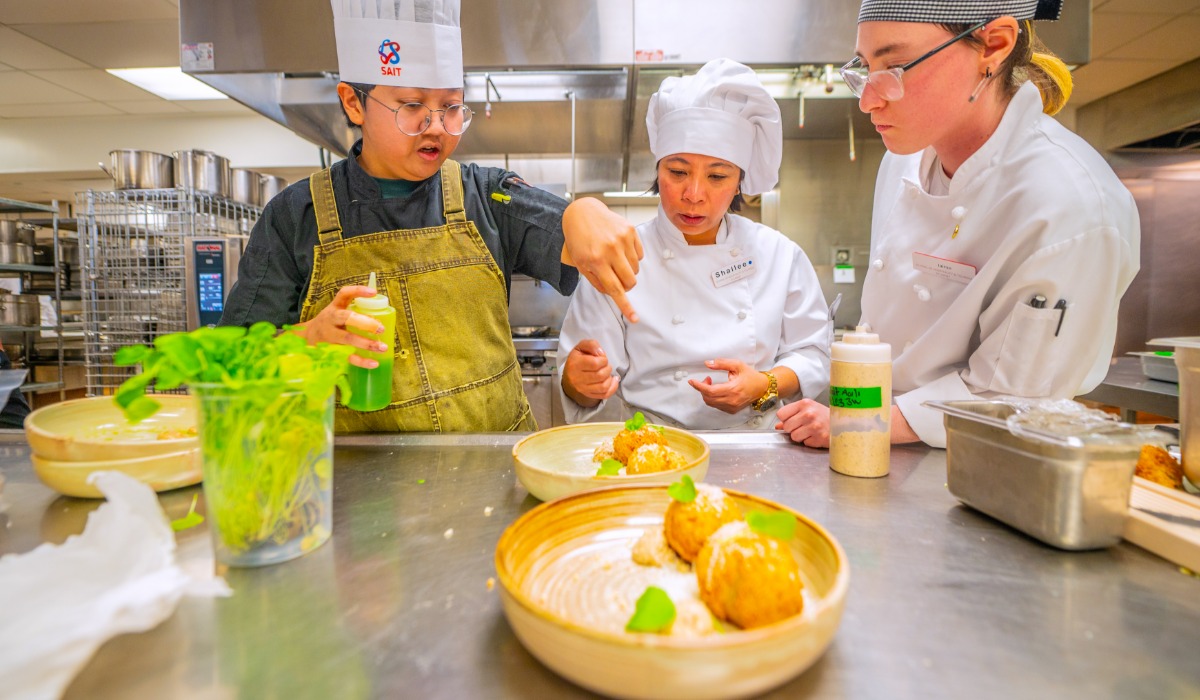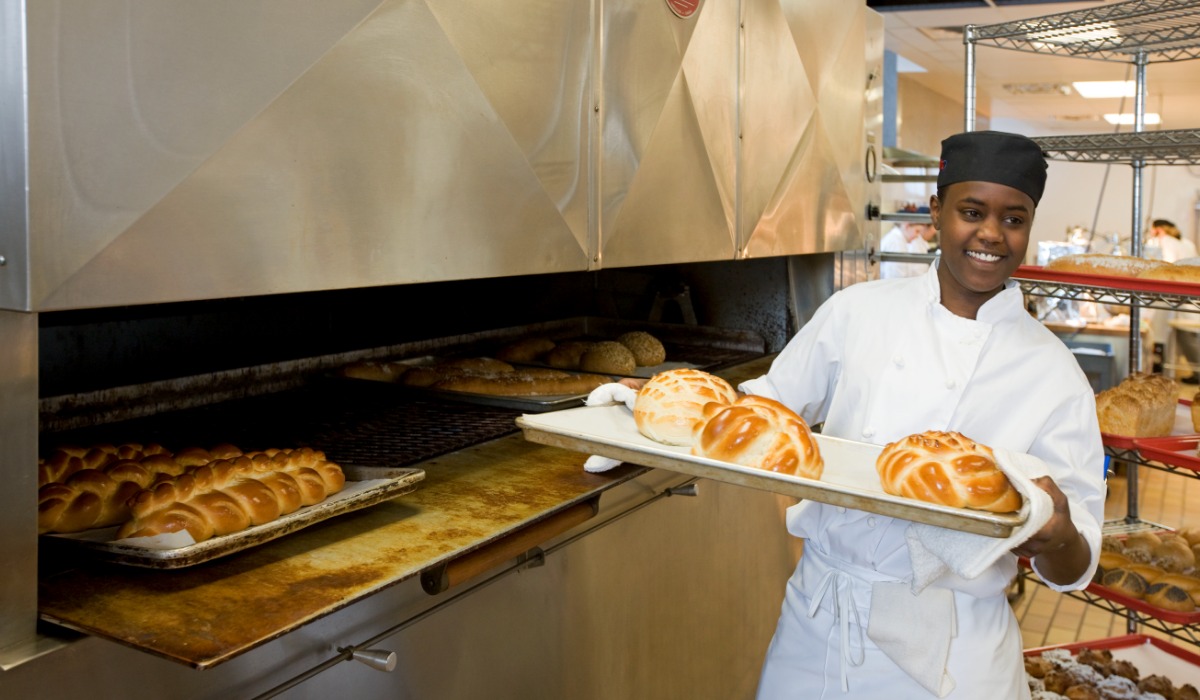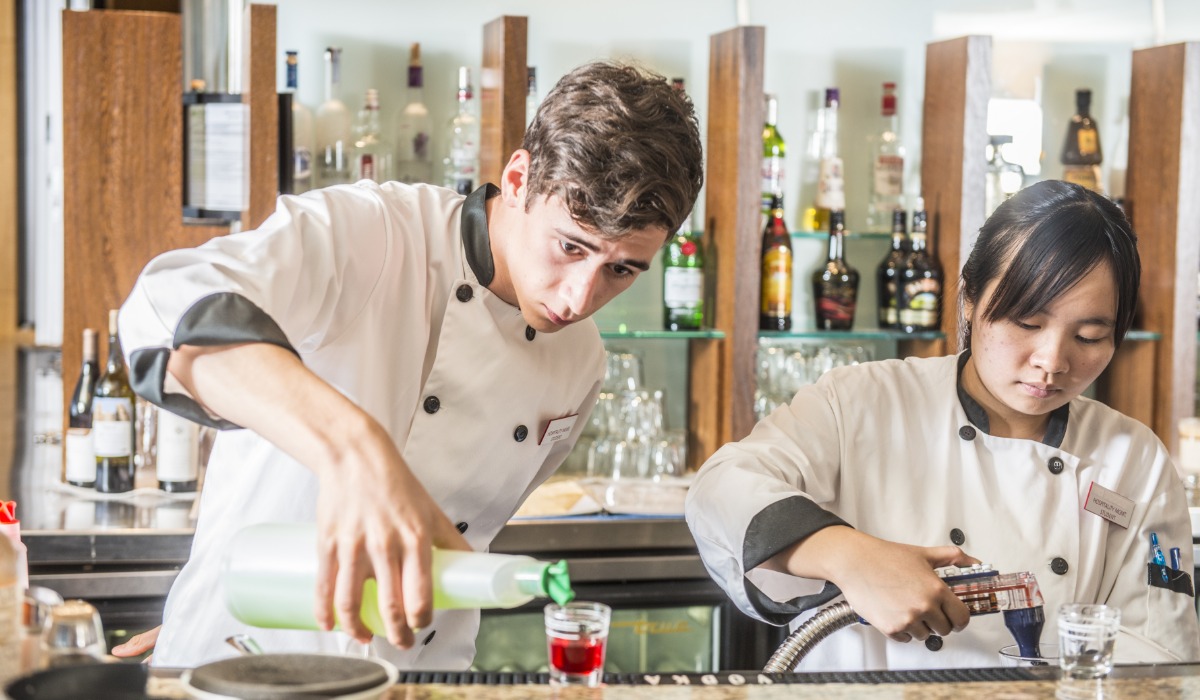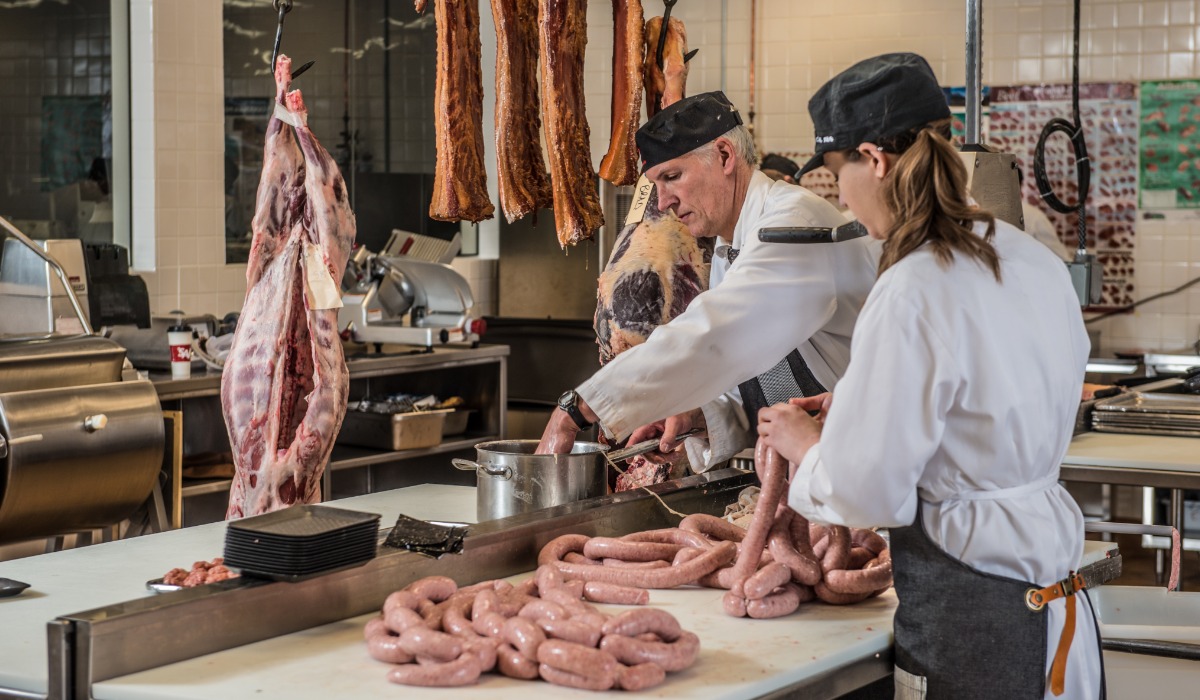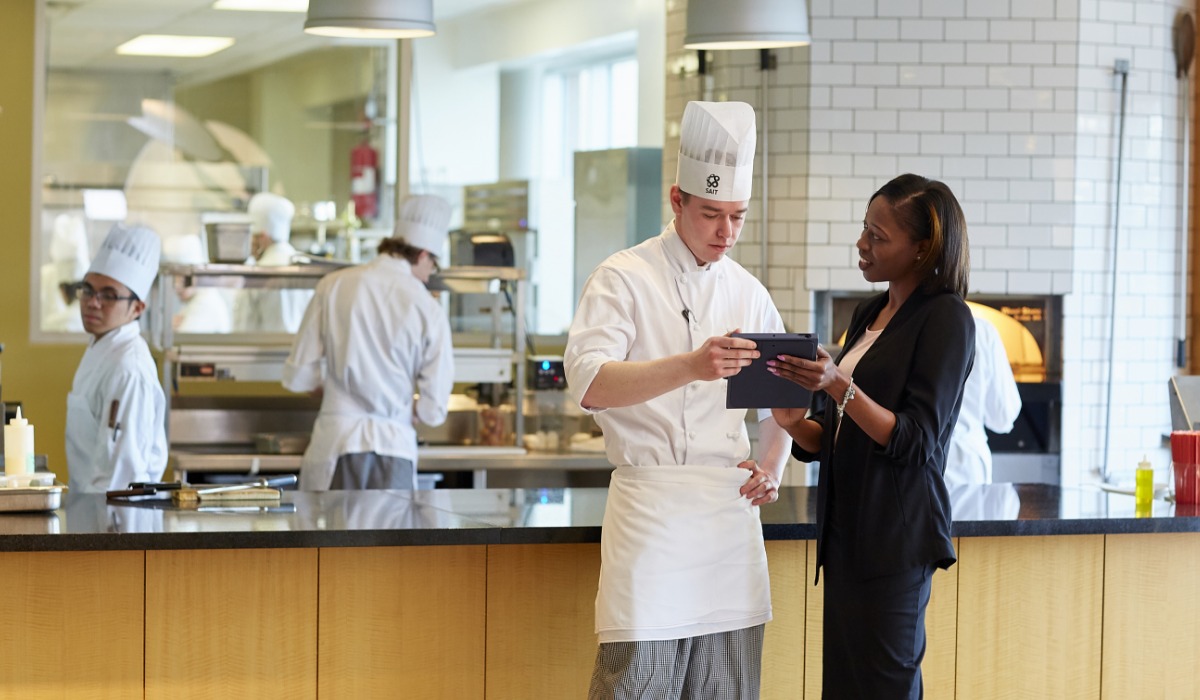Overview
Led by renowned chefs, our two-year Culinary Arts program offers expert, hands-on instruction at one of the best culinary schools in Canada. Train alongside culinary pros, gaining expertise in foundational cooking, garde manger, global cuisines, patisserie, culinary management and other culinary techniques.
Whether you want to be an executive chef, sous-chef, food stylist or pursue hotel and convention centre culinary opportunities, this program will prepare you.
Our focus is your success with small class sizes, personalized support, and upgraded facilities, including the Charcuterie Lab and SAIT's gourmet Marketplace. Real-world experiences at the Highwood restaurant, downtown Campus, and 4 Nines Dining Centre prepare you for the culinary industry.
Under professional chefs' guidance, develop essential cooking skills and stay updated with current trends through hands-on public cooking experiences, teamwork, and honing your professionalism and communication. You'll attain skills beyond those taught at the average cooking school.
You'll be able to showcase your skills during your year-end capstone courses. After graduating, you can go on to take additional exams to become a Red Seal chef.
Professional paid internship and study tours
Participate in a paid internship in your third semester, gaining industry exposure and connections.
Explore international destinations like Australia, France, Spain, Italy, Chile, and Thailand by participating in one of our optional study tours.
Global recognition through chef competitions
Compete locally and globally in culinary competitions, opening doors to a global career path.
Our students have secured gold and silver in Provincial and National Skills, Canadian Chef Association competitions, and top-three rankings in competitions worldwide, including France, Shanghai, Singapore, and Toronto over the last several years.
SAIT graduates have even competed in the prestigious Top Chef Canada competition. Whatever your culinary dreams and goals, this program will prepare you to bring the heat.
Those who work in culinary arts tend to be directive, methodical and innovative.
You need:
- a genuine love of food and cuisine
- artistic and creative talent
- good health and stamina
- a keen sense of taste and smell
- excellent hand-eye coordination
- strong math skills
- a memory for details
- communication skills, interpersonal skills and team-building skills
- the ability to remain calm in hectic circumstances
- the ability to stand for long periods
- willingness to work evenings and weekends or irregular hours
- organizational skills
- respect for food safety standards.
You should enjoy planning and organizing menus, supervising the work of others, and using tools and equipment to perform tasks.
This program aligns with the Alberta Apprenticeship and Industry Training (AIT) curriculum for all three technical training periods for Cooks.
You can challenge the first-year provincial exam after completing your first year, the second-year exam after completing your third and fourth semesters (provided you passed the first-year government exam), and the third-year exam after graduation (provided you passed the first and second-year government exams.)
Upon passing the exams, you can register as an apprentice and complete the 4,680 on-the-job training hours to earn your journeyperson designation.
During your third semester, you'll participate in a professional paid internship for a minimum of 240 hours.
During your internship, you'll learn in a real-world environment while you develop valuable industry connections and network with future employers.
You can also broaden your horizons and take advantage of exciting international study tours. Previous tour locations include Australia, France, Spain, Italy, Chile, and Thailand. Study tours are optional and have additional costs.
Finally, you'll participate in a year-end capstone project, where you'll showcase and demonstrate your skills.
After successfully completing this program, you'll receive a SAIT Culinary Arts diploma.
Careers and opportunities
Each year, SAIT conducts a survey between February and April to determine the employment rate, salary and satisfaction of our newest SAIT alumni.
![]() 98% graduate employment rate
98% graduate employment rate
![]() $39,000 average starting salary
$39,000 average starting salary
Find out more about our graduate employment statistics >
Our graduates may work in the following occupations. Some careers require additional experience and education.
Associated National Occupational Classification (NOC) codes: 60030, 62020, 62200, 63200, 65201.
Career planning support
Unsure which career path is for you? Here are some recommended career planning resources to help you decide your future.
You can also head to Alberta alis for lots of information about careers in Alberta, including quizzes and labour market information to help you narrow down a path.
Finally, you can take our online career finder quiz, which can help narrow your options based on your current skills and interests.
Courses
The Culinary Arts diploma requires 73.5 credits (25 courses) to complete.
The program spans two years, with two semesters each year.
| Course | Credits |
|---|---|
|
This capstone provides an opportunity for you to demonstrate practical skills and key theoretical learning from the first year of the program, including content from Culinary Management 1 and 2. You will be individually assessed through a practical capstone project, as well as through written and oral assessments. Pre-requisites:Concurrent Prerequisites:
Corequsites:
|
3 |
|
This course introduces fundamental culinary knowledge, focusing on safety and food sanitation, hands-on culinary skills, familiarization with lab equipment and safe food handling procedures. |
3 |
|
This course provides the tools, theory and practical experience to prepare classic and contemporary breakfast items. Topics include mise en place, safe handling, storage, cooking methods, production and service. |
3 |
|
This course provides the tools, theory and practical experience to prepare plant-based dishes, legumes, pulses and starches. Topics include mise en place, storage, safe handling, cooking methods, production and service. |
3 |
|
This course provides theory and practical experience to prepare hors d'oeuvres, salads, dressings and vinaigrettes, sandwiches and a variety of cold appetizers. Topics include mise en place, storage, safe handling, cooking methods, production and service. |
3 |
|
This course provides the tools, theory and practical experience to prepare soups, stocks and basic sauces. Topics include mise en place, storage, safe handling, cooking methods, production and service. |
3 |
|
This course provides the tools, theory and practical experience to prepare classic and contemporary dishes with meat, poultry and seafood. Topics include mise en place, storage, safe handling, cooking methods, production and service. |
3 |
|
This course provides the tools, theory and practical experience to prepare meat. Topics include mise en place, storage and safe handling. You will be exposed to primal and sub-primal cuts of meat. You will also learn about the relationship between muscle structure and the cooking process. |
3 |
|
This course provides the tools, theory and practical experience to prepare dishes in a short timeframe. Topics include mise en place, storage, safe handling, cooking methods, production and service. |
3 |
|
This course provides the tools, theory and practical experience to prepare various yeast goods and desserts. Topics include mise en place, storage, safe handling, cooking methods, production and service. |
3 |
|
This capstone provides an opportunity for you to demonstrate practical culinary skills and builds on key technical and theoretical learning from the second year of the program, including content from Culinary Management 1-5. You will be individually assessed through a practical capstone project, as well as through written and oral assessments. Pre-requisites:Concurrent Prerequisites:
Corequsites:
|
3 |
|
This course builds and enhances proficiency with the tools, theory, trends and practical experience related to classic and contemporary dishes in à la carte lunch restaurant operation. Topics include mise en place, storage, safe handling, cooking methods, production and service. Pre-requisites:
|
3 |
|
This course introduces, builds and enhances proficiency with the tools, theory, trends and practical experience of Canada's classic and contemporary cuisine. Topics include mise en place, storage, safe handling, cooking methods, production and service. You will learn about the Canadian landscape of food by preparing regional and national dishes. Pre-requisites:
|
3 |
|
This course builds and enhances proficiency with the tools, theory, trends and practical experience related to the presentation of desserts. Topics include mise en place, storage, safe handling, cooking methods, production and service. Pre-requisites:
|
3 |
|
This course builds and enhances proficiency with the tools, theory, trends and practical experience related to classic and contemporary dishes in à la carte dinner restaurant operation. Topics include mise en place, storage, safe handling, cooking methods, production and service. You will explore culinary trends, service styles, and the function and organization of kitchen brigades. Pre-requisites:
|
3 |
|
This course builds and enhances proficiency with the tools, theory, trends and practical experience related to cold food dishes including pâté and terrines. Topics include mise en place, storage, safe handling, cooking methods, production and service. Pre-requisites:
|
3 |
|
This course introduces, builds and enhances proficiency with the tools, theory, trends and practical experience of exotic ingredients & diverse cuisines. Topics include mise en place, volume cooking, storage, safe handling, cooking methods, production and service. You will explore and produce foods from popular culinary cultures. Pre-requisites:
|
3 |
|
This course builds and enhances proficiency in guest service and introduces event planning and execution. You will explore the importance of community engagement and social outreach to culinary professionals. Pre-requisites:
|
3 |
|
Culinary Management 1 introduces the tools, concepts and theory that you need to work proficiently in the culinary and baking industry. You will apply those tools, concepts and theories in your technical courses. During your learning journey, you will be introduced to communication and presentations; financial and inventory management; people, leadership, teams and culture; and social media, brand and marketing. |
3 |
|
This course continues your learning of the tools, concepts and theory necessary to develop proficiency in managing a culinary business. You will build on your knowledge of financial and inventory management, as well as people, leadership, teams and culture. You will also be introduced to culinary diplomacy and anthropology, beverage arts, and guest experience and service. Pre-requisites:
|
3 |
|
This course expands knowledge of the tools, concepts and theory necessary to further develop proficiency in managing a culinary business. You will continue to build your expertise in financial and inventory management, as well as people, leadership, teams and culture. Beverage arts will also be explored. Finally, you will be introduced to food science, sustainability, and health and wellness in hospitality. Pre-requisites:
|
3 |
|
This course builds proficiency in managing a culinary business. You will expand your knowledge of financial and inventory management, as well as people, leadership, teams and culture. You will enhance your skills in communication, social media, branding and marketing. You will also be introduced to kitchen facility management. Pre-requisites:Concurrent Prerequisite:
|
3 |
|
This course enhances proficiency in managing a culinary business. You will expand your knowledge of financial and inventory management, as well as people, leadership, teams and culture. You will also be introduced to menu planning and design, trends and technology in culinary arts, and hospitality entrepreneurship. Pre-requisites:
|
3 |
|
This course introduces students to culinary nutrition by surveying the tools, concepts, theories and practices used in the field. Students will also research and develop a nutritionally informed grab-and-go item. Pre-requisites:
|
3 |
|
This course provides a bridge between academic studies and practical, experiential learning. The choice of worksite is flexible and can include hotels, restaurants catering operations and other approved food service establishments. Proof of work experience is required for graduation. Pre-requisites:
|
1.5 |
Progression
You must attain a PGPA and/or a CGPA of 2.0 or better each semester and pass the prerequisite courses to progress through the program.
To qualify for graduation, you must pass all courses, attain a CGPA of 2.0 or better and complete course requirements within the prescribed timelines.
Admission requirements
Applicants educated in Canada
All applicants must demonstrate English language proficiency and meet all the following requirements or equivalents:
- at least 50% in English Language Arts 10-1, English Language Arts 10-2 or Humanities 10, and
- at least 50% in Math 10C or Math 10-3.
SAIT accepts high school course equivalents for admission for applicants educated outside Alberta.
All applicants who were educated outside of Canada must demonstrate English language proficiency and provide proof they meet the program admission requirements outlined above with an international document assessment. Find accepted educational documents and assessment options.
SAIT may also accept courses completed at certain international post-secondary institutions.
Academic Upgrading
Missing an admission requirement for this program? Upgrade your prior education to help you receive admission into one of SAIT's career programs.
English language proficiency
All applicants must demonstrate English language proficiency prior to admission, including students educated in Canada.
Transfer agreements
At SAIT, we have created transfer agreements with partner institutions to allow you to earn course credits toward your SAIT program based on your previously completed credentials.
Transfer Alberta search tool
Use the Transfer Alberta search tool to see all transfer agreements between Alberta post-secondary institutions (including those with the University of Calgary, Mount Royal University and Bow Valley College.)
Search transfer agreements in Alberta
Transfer options for graduates
When you have completed this program, you may continue your education at a partner post-secondary institution. These transfer agreements include partnerships within and/or outside of Canada.
Available intakes
Winter 2026
Start dates:
- Domestic students: Waitlisted
-
-
Application deadline: Extended
-
- International students: Closed
-
-
Application deadline:
-
Fall 2026
Start dates:
- Domestic students: Open
-
-
Application deadline: June 30, 2026
-
- International students: Open
-
-
Application deadline: May 29, 2026
-
Winter 2027
Start dates:
- Domestic Students (apps open March 4, 2026): Closed
-
-
Application deadline: Oct. 23, 2026
-
- International students: Open
-
-
Application deadline: Oct. 9, 2026
-
Costs
2025/26 tuition and fees
The following costs are effective as of July 1, 2025.
The estimated total cost of tuition and fees is based on the suggested schedule of study. Following a modified schedule will impact the fees you pay per semester and may alter final costs.
Students in this program pay an additional mandatory fee of $188.00 per year of study for uniform and apron laundry services.
Domestic students
The program total is based on the estimated amount you will pay if you enter this program during the 2025/26 academic year. The program total amount listed on your letter of admission may appear higher. This amount is your maximum tuition guarantee for the program. SAIT will not exceed this maximum, regardless of changes in tuition and fees between academic years.
Books and supplies are approximately $900. You will need to purchase these in your first week.
This is a bring-your-own-device program with a standard computer hardware and software requirement. See the specific requirements on our computers and laptops page.
Find your booklist on the SAIT Bookstore's website. The booklist will be available close to your start date. Can't find your program or course? The bookstore didn't receive a textbook list. Contact your program directly to determine if they're still refining course details or if you're in luck; no textbook purchase is required for that term.
Required equipment/tools
You must purchase a professional knife kit.
The cost is $500 and must be purchased through a dedicated website.
You will receive an email one month before your start date to purchase the kit by credit card.
Required uniform
One of your first steps to becoming a Culinary Arts student is to make sure you have the required attire on your first day of class and dress appropriately throughout the program.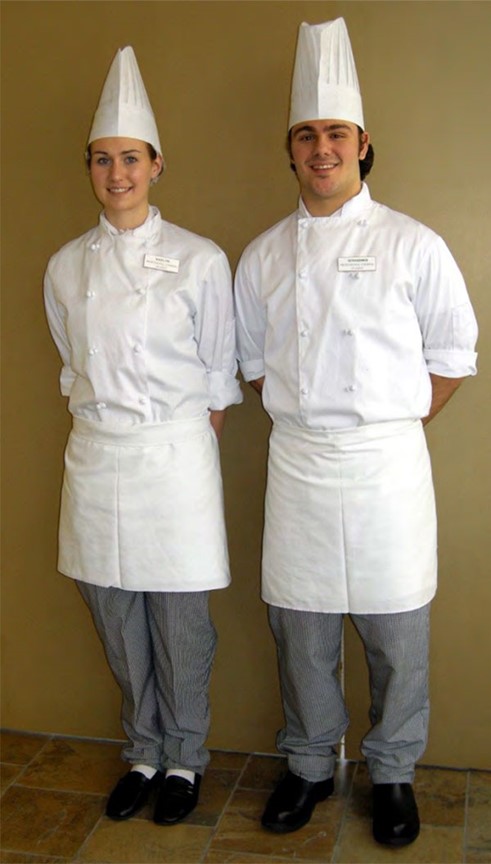
Your uniform includes:
- Hairnet (all hair must be tucked into your hairnet)
- Chef's hat
- Necktie
- Chef's whites
- Name tag
- Waist apron
- Chef's pants
- Chef's clogs or non-slip shoes
Jewelry, including rings, bracelets and dangling earrings, are not to be worn in class. Wedding bands, stud earrings and watches are acceptable.
Your Chef's jacket, waist apron and pants are required with an annual laundry fee of $250 (included in your tuition).
Your Chef's hat, necktie, hairnets and gloves (included in the tool kit) are available from The Market Place.
SAIT will have a vendor on site on the Orientation day selling professional non-slip kitchen shoes, but shoes can also be purchased at any professional shoe vendor. We suggest buying a clog-style shoe.
Wearing your uniform to class is mandatory.
Internship fees
Internship course fees are due in May of your first year (approximately $553 for domestic students.)
This is included in the overall tuition listed in the fee table. However, it often comes as a surprise since most of your tuition is due in August and January.
Optional study tour
There is an optional international study tour between the first and second years. If interested, you should budget approximately $3,500.
Financial aid
Paying for your education may feel overwhelming, but we have resources and programs that can help, including information about payment options, student loans, grants and scholarships.
Application process
Ready to apply?
Follow our step-by-step guide to submitting a successful application.
Communication during admission
Email is the primary source of communication during the selection process. Ensure your personal email account is managed appropriately to receive our emails, files and communications. We recommend you add the hospitality@sait.ca domain to your safe senders' list or you risk missing critical email messages.
Begin your application
Apply now using the online application portal.
Ensure you have a valid Visa or Mastercard to pay the non-refundable application fee of $120 for domestic applicants or $175 for international applicants.
Information sessions
Prepare for a strong start in your chosen program or get the details you need to decide your future path.
Our expert staff and faculty are ready to answer your questions and provide information about the following:
- What sets SAIT apart
- An introduction to the program and area of study
- Admission requirements
- Future career paths
- Information on the earning potential and graduate employment rates.
Contact us
School of Hospitality and Tourism Advising
-
Phone - 403.284.8612
International Student Advising
-
Phone - 403.284.8852
-
Email - international@sait.ca
Subscribe for updates
Your journey starts here! Sign up to get important updates on:
- Food and hospitality programs
- Application information
- Relevant news and events

Oki, Âba wathtech, Danit'ada, Tawnshi, Hello.
SAIT is located on the traditional territories of the Niitsitapi (Blackfoot) and the people of Treaty 7 which includes the Siksika, the Piikani, the Kainai, the Tsuut’ina and the Îyârhe Nakoda of Bearspaw, Chiniki and Goodstoney.
We are situated in an area the Blackfoot tribes traditionally called Moh’kinsstis, where the Bow River meets the Elbow River. We now call it the city of Calgary, which is also home to the Métis Nation of Alberta.
